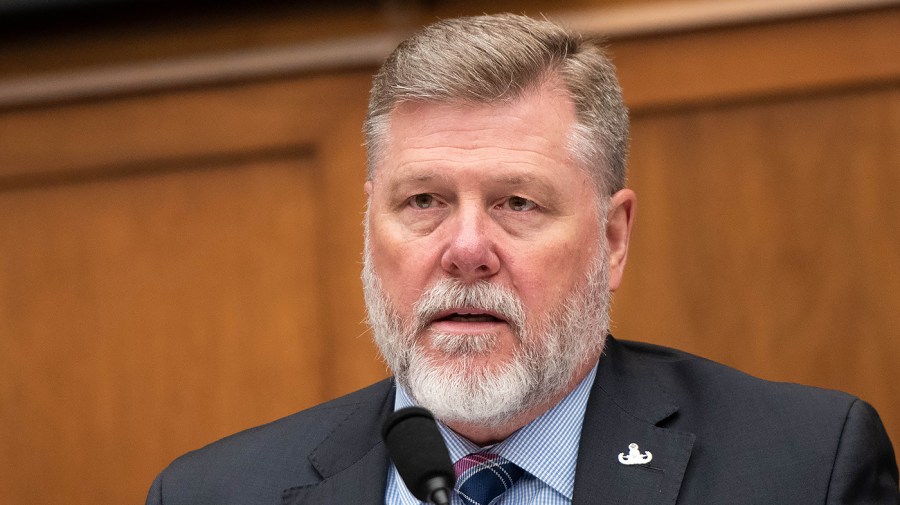
Speaker Mike Johnson (R-La.) on Thursday selected Rep. Rick Crawford (R-Ark.) to chair the House Intelligence Committee, elevating the veteran panel member to the role after he removed Rep. Mike Turner (R-Ohio) from the top job.
The shift was a surprise on Capitol Hill, where Turner’s ouster sparked an outcry from Democrats and some Republicans who were given no advance warning of the move — and suspected that the “America First” wing of the party helped push Turner out.
But Johnson’s selection of Crawford, the most senior GOP lawmaker on the panel, could help calm concerns from national-security focused Republicans.
“Our intelligence community and its oversight must maintain the highest levels of trust. The House Intel Committee will play a pivotal role in this work in the new Congress, and Rick Crawford will provide principled leadership as its chairman,” Johnson said in a statement. “He has earned the respect of his colleagues through his years of faithful service on the committee and his steady approach to the challenges facing our country.”
The announcement from Johnson came less than 24 hours after news broke that he would not re-appoint Turner to lead the Intelligence Committee in the 119th Congress amid, according to one GOP lawmaker, complaints from hardline conservatives and “Mar-a-Lago” about his leadership.
Johnson has denied that President-elect Trump played any role in the decision, and a spokesperson for Trump also indicated that he did not request the shakeup. The Speaker has the sole authority to appoint the Intelligence Committee chairman and GOP members.
Crawford, who is in his eighth term in Congress and is starting his fifth term on the Intelligence Committee, had unsuccessfully sought to be chairman of the Transportation and Infrastructure Committee at the end of last year.
He declined to comment when asked about the reports of his appointment ahead of Johnson’s announcement, deferring to the Speaker. But when asked if he was interested in the role, the Arkansas Republican left the door open.
“Anybody would be interested in taking a position as a committee chair, so I don’t think I’m any different than anyone,” he said.
Crawford supported renewal of a controversial law allowing the warrantless surveillance of foreigners when they are abroad, Section 702 of the Foreign Intelligence Surveillance Act (FISA).
It’s a measure that has earned the ire of the MAGA wing of the party, who see the intelligence tool as a backdoor for gaining access to Americans and who want to include a warrant requirement.
Turner was also a major proponent of the tool, putting him at odds with staunch Trump supporters like Rep. Scott Perry (R-Pa.), a critic of the law and one of the few Intelligence Committee members to vote against extending FISA 702.
Renewal of FISA 702 will be a major issue facing this year, as Congress voted to extend the measure for two years — pushing what will no doubt be a controversial reauthorization into the Trump presidency.
Crawford also voted against a $60.8 billion Ukraine aid package in 2024, saying in a statement at the time: “While the entire Western world stands in support of Ukraine’s fight to expel Vladimir Putin’s Ukraine invasion force, I cannot in good faith vote to send billions of dollars in non-military financial aid to Ukraine to prop up its economy when Americans are struggling with rising costs at home.”
Turner, on the other hand, has been a strong Republican supporter of aid to Ukraine — drawing the ire of Trump-allied, America First conservatives.
Crawford has played an elevated role on the Intelligence committee in recent weeks.
He led a subcommittee investigation into the origins of the anomalous health incidents (AHI), also known as Havana syndrome, that have been plaguing some in the intelligence community.
In that assessment he departed from the conclusion of intelligence leaders, asserting that as foreign adversary was likely behind the attack.
“I’m convinced that there is a foreign adversary responsible for these. … Now to be clear, it doesn’t mean all these incidents that have been reported are attributable to a foreign adversary. It just means that the evidence supports that in many cases,” Crawford told reporters last month.
“This is not speculation on my part. This is me telling you we have collected evidence that I can confidently say we can attribute many of these AHI attacks to foreign adversaries.”
In doing so, Crawford was highly critical of the Biden Administration, criticizing the president for an issue that the county has grappled with since 2016.
But he blamed the White House both for a failure to take action and suggested they engaged in a cover up on the topic.
“The Biden Administration and IC leadership has sought to hinder the Subcommittee’s investigation into AHIs to keep the truth about AHIs from Congress and, by extension, the American public,” he said, using an abbreviation for the intelligence community.
Across the aisle, Democrats wasted no time bashing Johnson’s decision to replace Turner at the top of the Intel panel, accusing the Speaker of catering to the wishes of Trump at the expense of national security.
“The Constitution demands that Congress function as a check and balance to the Executive Branch, not cater to its demands,” said Rep. Jim Himes (Conn.), the senior Democrat on the committee.












